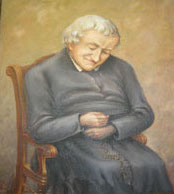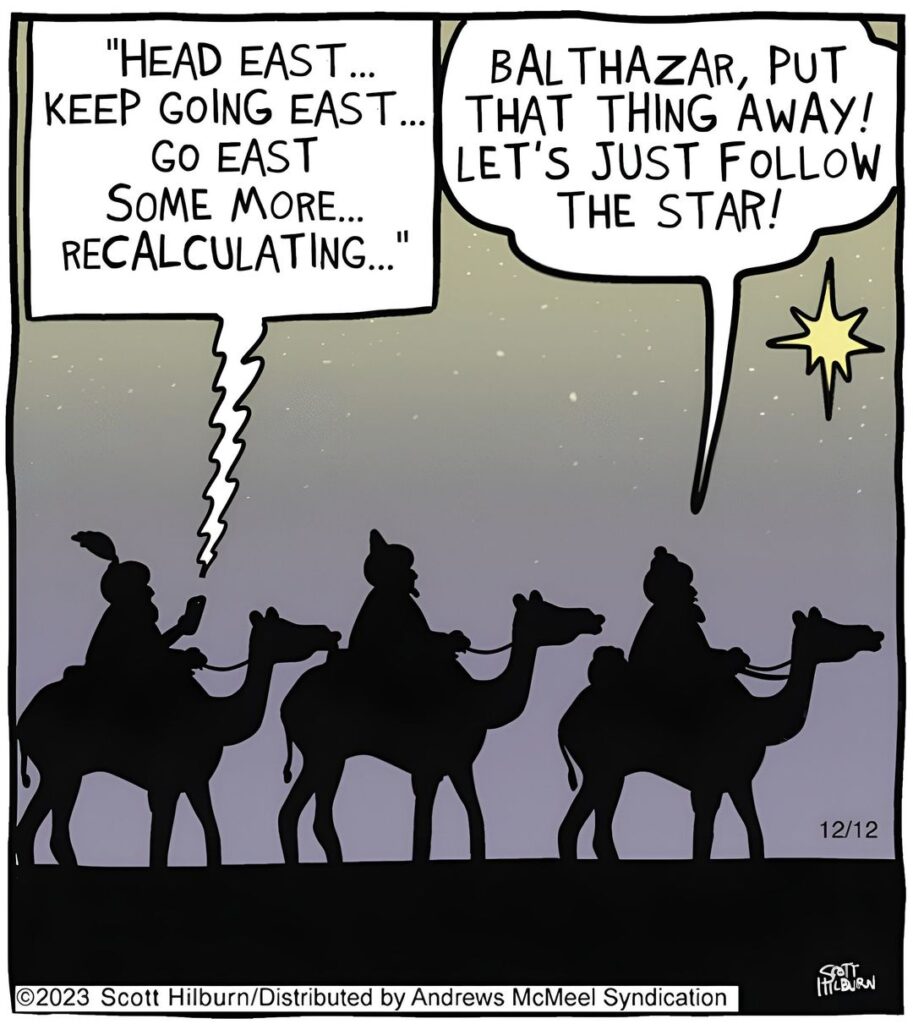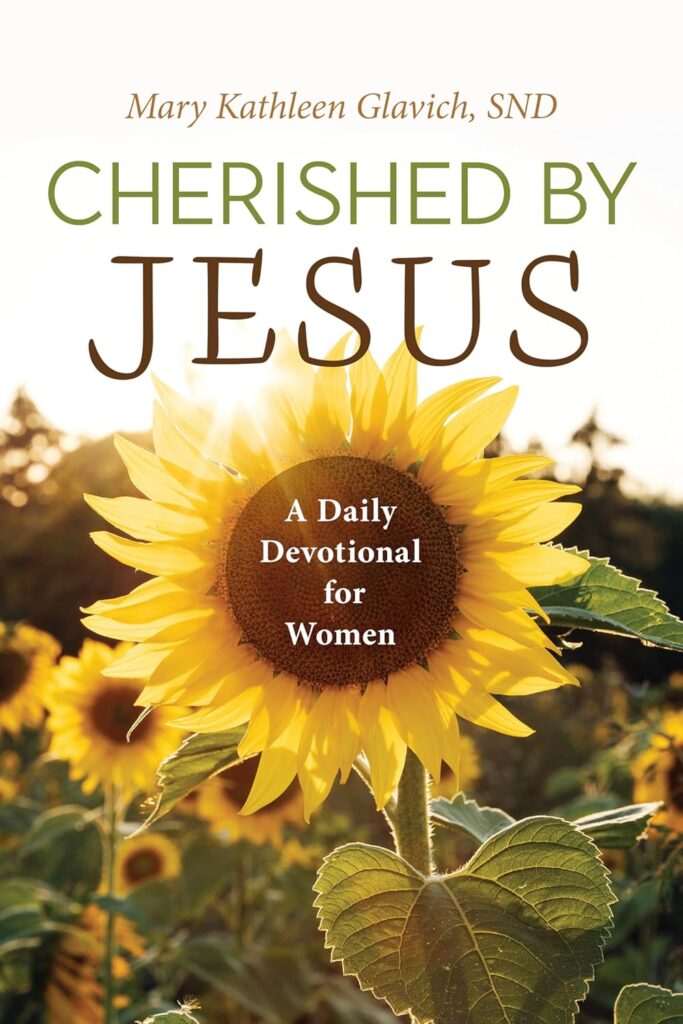St. Julie Billiart, Spiritual Mother, Model for All

St. Julie Billiart founded the Sisters of Notre Dame of Namur, who passed her spirituality on to the Sisters of Notre Dame of Coesfeld, my community. We were founded by two young women in Germany. We regard St. Julie as our spiritual mother. Her life was incredible, amazing.
Recently I had occasion to look up a video program on St. Julie’s life that I had made for my province. I had hoped to show it to you, but it’s been blocked on vimeo. Luckily I saved the script, which I share with you here:
St. Julie Billiart, Childhood

About 270 years ago in the French village of Cuvilly Mother Julie was born. She was named Marie Rose after her sister who had died at age seven. The name Julie was added. For the 25th anniversary of Julie’s canonization a street in Cuvilly was renamed Julie Billiart. In Namur there is also a street named for her. Julie valued her baptism. During her time, religious received Communion only on days that the Superiors permitted. Julie said that her Sisters may receive Communion on their baptismal anniversary and their feast day.
The Billiart house was one-storey mud house with three rooms: a bedroom, Julie’s room, and the family’s store. It had a large courtyard. The home was destroyed in 1918 during World War I but reconstructed in brick in 1934 and renovated in 1984.
A Born Teacher
When it came to religion, Julie was precocious. By the age of seven she had memorized the whole catechism. When she was eight, she was already gathering poor children and teaching them religion and how to read and write. While children made their first communion at age thirteen or fourteen, Fr. Dangicourt, let her make it privately when she was nine. She made a vow of chastity when she was fourteen and at the age of twenty obtained permission to receive the Eucharist every day.
As a child, Julie enrolled herself in the Confraternity of the Sacred Heart, promising to pray from 2 to 3 in front of the Blessed Sacrament on Good Friday. On the day she was confirmed, a Knight of Malta approached her in a crowd and presented her with a relic of the true cross, which she donated to her parish.
First Tragedy
Julie’s older sister Madeleine was almost blind, and her younger brother Louis was sickly and crippled. Julie helped care for them and for other needy people in the village. When thieves stole most of the goods in the Billiart store, the family faced poverty. For six summers Julie worked as a harvester and taught religion to the other workers. The rest of the year, walking or on horseback Julie traveled to other towns to sell lace and fabric that remained.
The Carmelite sisters at Compiegne were her friends, and they helped her refine her needlework skills. They also introduced her to the writing of St. Teresa of Avila. These were the sisters who were taken to the scaffold in the French Revolution.
Sickness
When Julie was twenty-three, she was with her father in the store when a rock crashed through a window and a bullet nearly missed him. This incident triggered a nervous reaction in Julie which led to her complete paralysis, which she endured until she was fifty-three years old and cured miraculously during a novena to the Sacred Heart. Modern doctors think Julie might have had multiple sclerosis.
From her bed, Julie prepared children for First Communion and served as spiritual director to well-to-do ladies. She also spent long hours in prayer. People called her the Saint who Smiles. Fr. Dangicourt brought Julie Communion every day and gave her a cat, which much later a zealous priest had her kill as an act of penance. When the bishop heard of the Saint of Cuvilly, he asked to see her. She went by stagecoach with her father to Beauvais. There before twelve priests, the bishop questioned Julie about the faith. He concluded, “That young woman seems to me to be inspired by God himself. I will be surprised if we don’t hear more about her later.”

Julie suffered other ailments besides this long-lasting one that was accompanied by insomnia, nausea, and convulsions. As a child, she began to lose her sight. Her mother took her and her sister Madeleine to Lyon where an icon was known for healing vision problems. Both girls were cured. Many times during the course of her life, Julie succumbed to diseases like malaria.
Persecution
During the French Revolution, from her sickbed Julie arranged hiding places for loyal priests and refused to see the parish schematic priest. A friend, knowing that Julie was in danger, invited her to stay at her chateau. Julie’s sixteen-year-old niece accompanied her and stayed with her for twenty-two years. Revolutionaries came after Julie, threating to burn her at a bonfire, she and her niece narrowly escaped hidden under hay. They landed in Campeinec, where they moved five times.
Prophetic Vision

One Good Friday there, Julie had a vision in which she saw Jesus on the cross surrounded by women in strange clothing. A voice said, “Behold the daughters whom I give to you in this institute, which will be marked by the cross.” Julie saw sisters whom she recognized later and the one who would be her companion and support was revealed to her, namely Francoise.
A Best Friend

Francoise Blin de Bourdon was the opposite of Julie, who was five year older than she. She was a highly educated aristocrat who had been presented at Versailles, the court of King Louis XVI and Marie Antoinette and had become friends with his sister. Like Julie, she was a victim of the Revolution. Imprisoned with family members, she was slated to be guillotined on July 29. Fortunately, the Reign of Terror ended the day before. Francoise went to live at her brother’s mansion, Hotel Blin. She intended to become a Carmelite. Julie arrived two months later.
At first Francoise felt uncomfortable with Julie because she could hardly understand her labored speech, but gradually the two became friends, friends for life. As Julie once said, “We’re like two bees under one bonnet.”
In 1799 the two women, Julie’s niece, and their chaplain Father Thomas were forced to flee again and went to Bettencourt. There the priest helped Julie speak. With the coming of Napoleon, Catholics were allowed to practice their faith again after the seven-year-hiatus. Julie, Francoise and Fr. Thomas began teaching at their house.
A New Community

When Fr. Joseph Varin, superior of the Fathers of the Faith as the Jesuits were called witnessed Julie teaching from her portable chair, he was very impressed. Eventually he persuaded her to establish a religious community with Francoise. On Feb, 2, 1804, Julie, Francoise, and a woman named Catherine made a vow of chastity, promised to devote themselves to the education of orphans and teacher formation. They renewed their consecration to the Sacred Heart and to the Immaculate Heart of Mary. At age fifty-two, Julie became Mother of this community that had Our Lady as patroness. That day Fr. Varin gave each sister a medal of the Our Lady of Guadalupe. This medal is visible in St. Julie’s portrait. (See top photo.) Soon after, Catherine became ill and left.
In France, habits were not allowed, so Julie’s sisters wore outfits dyed violet. Outdoors they wore the garb of peasant women: a woolen mantle and a white pleated cap that tied under the chin.
A Cure
Julie and Francoise taught catechism classes at the Amiens cathedral where the statue of “The Beautiful God” stood by the west doors. In 1804 they began giving a month-long mission there. On the day after the mission closed, Fr. Enfantin, appointed Julie’s spiritual director, invited her to pray the novena “for someone” that led to her cure.
Freed from paralysis, Julie went from town to town giving missions. On October 15, 1805, Julie and three other sisters pronounced vows according to a longer rule of life. Julie became Sister Mary Ignatia, but because the Jesuits had been suppressed, Fr. Varin advised that she go by the name Julie. Francoise became Sister St. Joseph.

Julie was innovative in planning her community. French communities were cloistered, but her sisters would be like Jesus, out in the world spreading the faith. They would be contemplatives in action. They would not pray the Divine Office together and there would not be two classes of sisters, choir sisters who prayed and lay sisters. All would be equal. They participated in daily Mass, meditated for an hour in the morning and a half hour in the evening before the Blessed Sacrament. At noon they made an examination of conscience. Daily they prayed the rosary and read from a spiritiual book. Each evening they prayed an Act of Reparation to the Sacred Heart of Jesus together, and on the Thursdays before First Fridays they made a holy hour before the Blessed Sacrament. Every year each sister made a silent eight-day retreat.
Different Kind of Community
Fr. LeBlanc would be in charge of the new community, and Father Sambucy became their confessor. Unfortunately the confessor had his own ideas about the community. For one thing he envisioned it as working solely in Amiens.
On February 2, 1806 during instructions on the Presentation, Julie began singing the Nunc Dimittis. After the line “a light of revelation to the Gentiles, she stopped, and staring at the crucifix when into a trance. Later she told Francoise, “God let me know that we will carry the ight of the gospels to all nations. We are not to be liminted to one diocese of country.” That is why she would exhort her sisters, “Have a heart as wide as the world.”
In June that year Julie was invited to visit the bishop of Ghent 120 miles away and did so with Fr. LeBlanc’s blessings. Thus began the Sisters spread into Belgium, where the sisters were permitted to wear habits. Julie designed them: a black dress, a black wool bonnet over a white cap, and a white cape. A black veil would be worn only in chapel. The next convent opened in Belgium was in Namur.
Crosses
Back in Amiens, Julie decided to broaden the ministry from caring for orphans to opening free schools for girls. Fr. Sambucy, a gifted but overzealous man, regarded himself as the founder of the community. He undertook to take Julie’s place in guiding the sisters and reforming them as a monastic community. To get rid of her, he turned the Bishop of Amiens, Bishop Demandolx, against her and wrote poison pen letters about her to other clergy and Julie’s friends. He persuaded Francoise to turn over her finances to him. Father Varin made Fr. Sanbucy ecclesiastical superior of the SNDs. Fr. Sanbucy appointed Sr. Victoire, superior of the convent in place of Mother Julie. This young, uneducated sister had only been with the community a year and a half.
The Misguided Bishop

Things came to a head when Bishop Demondolx forbade Julie to step foot in Amiens. When she was seriously ill, he allowed her an audience. During it, kneeling on the floor she begged his pardon, although she hadn’t done anything wrong. He allowed her to go to the convent until she recovered. Then the bishop ordered that Julie and Victoire be co-superiors. Since Julie was not allowed to leave the convent, Fr. Sambucy was to do the visitation in the convents. The situation grew worse. Despite the humiliation and abuse she suffered at the hands of the clergy, Julie took it all in stride and trusted her good God.
Eventually the Bishop ordered Julie to leave his diocese, and she found refuge in Namur. Later he invited her back, but lack of vocations and finances there prohibited it. The bishop died from a brain tumor, which perhaps explained his strange behavior.
War
Julie’s energy was boundless. She opened one house after another, kept in touch with all the sisters by visits and letters that fill seven volumes today. over twelve years, she made 120 journeys. In 1813 she visited Pope Pius VI who was under house arrest. He gave her a crucifix. All she said about the visit was that they wept together about the troubles of the Church.
After the Allies defeated Napoleon, they invaded France and Belgium which was under French control. For five months Julie protected seventy sisters and children at Namur and saw that they were fed. She hid the community valuables and barricaded the door. Sometimes she prayed all night and could hear the pounding at the door. Napoleon rallied battles were fought in Belgium and again hungry soldiers roamed the streets. Julie was worried sick about the sisters in her houses.
Most Painful Cross
Her heaviest cross, though, was from her own sisters. Because Napoleon did not remove Bishop Pisani of Namur from his post and sister Julie supported this bishop, some sisters accused her of being against the Church. Those in Ghent threatened to break from the community. In addition, because Julie departed from the daily schedule when people’s needs called for it, some sisters reported her to the bishop. This went on for five years. Most painful was that these were three of her earliest followers whom she loved. Two of them didn’t realize their mistake until after she died.
After falling on a wet staircase in the Namur convent, Julie became ill. For days she was in excruciating pain. She couldn’t eat and couldn’t bear the slightest sounds. On April 7, she sang the Magnificat and then became unconscious. She died at 2 a.mm the next day. Signs were posted around Namur, “The Saint is dead.” Shops were closed on the day of her funeral. Julie left behind 15 houses she founded and 82 sisters and novices.
Here is an upbeat song about God is good:
• What most impressed you about the life of St. Julie Billiart?
• St. Julie’s maxim was “How good is the good God!” Why do you think she could say this when her life was rife with crosses?
Epiphany, a Feast of Love from Gentiles and Us

Three Epiphany Gifts from Kings
Visitors from Abu Dhabi once brought me the gift of frankincense from Yemen in a beautiful carved box. It is pictured here. Frankincense, which is the resin of a certain tree, has a strong scent that lingers on your fingers when you touch it.
We’ve just celebrated the feast of the Epiphany, which is also known a “Little Christmas.” It commemorates the visit of the wise men to the infant Jesus, when the Messiah is revealed to Gentiles. As you probably know, the wise men (also known as kings or magi) presented gifts of gold, frankincense, and myrrh. A cartoon states that if women had come, their gifts would have been practical ones, like diapers. Nevertheless, the three gifts of the wise men are symbolic: gold for a king, frankincense for a God, and myrrh for suffering. (Myrrh was a spice used in burial.)
We don’t know how many wise men followed that star to the king of the universe. The number was set on three based on the fact that there were three gifts. Much later, the three kings were given names: Caspar, Melchior, and Balthasar. It’s thought that they were from Persia.
People have theories of what that moving star was. I wonder how the kings could tell the right house since the star obviously was above the whole town. Although the Gospel doesn’t say, I bet when these strange visitors came to the Holy Family’s home, Mary provided refreshments for them.
Epiphany Customs
Christians have the tradition of blessing their houses on the Epiphany. A priest or the head of the house prays and writes above a doorway 20 + C + M + B + 25 with chalk. The digits are the current year. The letters are the initials of the three kings’ names. They also stand for the Latin words for “Christ bless this house.” Crosses join the elements.
Did you know there is a Three Kings Cake and other Epiphany traditions worldwide? The cake has a little figure of the baby Jesus hidden in it. Whoever finds it wins a prize.
An Epiphany Gift from Us
The feast of Epiphany prompts us to muse about what gift we would give Jesus. No doubt you are familiar with the song “The Drummer Boy.” His gift is playing on his drum for Baby Jesus. (Hopefully Mary had not just gotten her baby to fall asleep!) Christina Rossetti composed this charming poem:
What can I give Him, poor as I am?
If I were a shepherd, I would bring a lamb;
If I were a wise man, I would do my part;
Yet what can I give Him?
Give Him my heart.
Christina had the right idea. What would make Jesus the happiest would be the gift of our love. We show him our love by giving him ourselves. We do this each morning in the morning offering prayer: “O Jesus, I offer you my prayers, works, joys, and sufferings of this day….” As a Sister, my night prayer begins, “O Jesus, I offer you again through Mary’s hands all the works of this day.”

At each Mass we offer God ourselves. A priest suggested that we imagine ourselves with the host on the paten when it is lifted to God. One of my favorite prayers is this one of St. Ignatius:
Take, O Lord, and receive my entire liberty,
my memory, my understanding and my whole will.
All that I am and all that I possess, you have given me:
I surrender it all to you to be disposed of according to your will.
Give me only your love and your grace;
with these I will be rich enough and will desire nothing more. Amen.
During the day we can renew our gift: offer God our success at winning a contest, offer our hard work, offer the pain of a headache, the sadness of a rejection, the humiliation of a failure. The list can go on.
Why We Love God
Psalm 116:12 is “What shall I return to the Lord for all his goodness to me?” The day I was interviewed by the superior before entering the convent, she asked, “Why do you want to be a Sister?” I answered somewhat like this: “God has been so good to me, I want to give him all that I am. This seems to be the best way for me to do that.”
Here is another prayer that I adopted in high school. It’s attributed to St. Francis Xavier.

O God, I love thee for yourself
And not that I may heaven gain,
Nor yet that they that love you not
Must suffer hell’s eternal pain.
You, O my Jesus! you did me
Upon the cross embrace.
For me did bear the nails and spear
and manifold disgrace;
And griefs and torments numberless;
And sweat of agony;
E’en death itself—and all for one
Who was your enemy.
Then why, O blessed Jesus Christ,
Should I not love you well:
Not for the sake of winning heaven
Or of escaping hell;
Not with the hope of gaining aught,
Not seeking a reward;
But as you have loved me,
O everloving Lord.
E’en so I love thee and will love,
And in your praise will sing
Solely because you are my God
and my eternal King.
In God’s eyes, the gift of our love is his greatest treasure. (And you needn’t be a Sister to offer that.)
I like this cartoon:

Here is a gentle version of the simple hymn “I Love You, Lord.”
A commercial: You might be moved and inspired by reading my book A Love Affair with God available on Amazon.
• What aspect of the Epiphany touches your heart!
Mary, God’s Mother and Ours

Mary, God’s Mother and ours is the focus of the first day of this new year. We celebrate and honor her on this Solemnity of the Blessed Virgin Mary, pray for her to intercede for us, and look to her as a model in living according to God’s will.
Mary knew the Shema, the Jewish prayer recited twice a day: “Hear, O Israel: The LORD is our God, the LORD alone. You shall love the LORD your God with all your heart, and with all your soul, and with all your might.” Jesus identified this as the greatest commandment. It describes how deeply Mary loved God—with her whole being. For love of God, at the Annunciation, she surrendered herself to him and let him use her to become a human being. By doing this, she risked her life for God because according to Jewish law, an unwed mother was to be stoned to death. Mary also risked her life by following the second greatest commandment: Love your neighbor as yourself.
Mary “Mothers” Elizabeth
Imagine suddenly becoming pregnant with the Messiah, the Savior of the World. What would you do afterwards? Any ordinary woman would probably seal herself in the house, taking care that nothing would endanger her or the miracle baby growing within her.
But Mary, the Blessed Virgin, was no ordinary woman. She dared to venture out on an errand of mercy, what we call the Visitation. When the Angel Gabriel delivered God’s message to Mary that she was the woman chosen to be the Mother of God, he had a postscript. Her cousin Elizabeth, who was childless and too old to conceive now, was also miraculously pregnant. Why did God reveal this to Mary? Because God knew he could depend on her to respond to someone in need. And she did. Mary’s compassionate heart impelled her to be with Elizabeth during her last three months of pregnancy. In fact, the Gospel specifies that Mary went to help Elizabeth “in haste.”
(more…)Christmas 2024, A Time to Be Merry

Christmas 2024 is a time to be merry, to take a break from the problems and distress of the last twelve months. It’s a time to gather with relatives and friends and celebrate that God did not desert us but came among us to fill our hearts with hope. I wish you a Merry Christmas and a blessed New Year! To add to your merriment, here is a collection of Christmas cartoons.
But first, here is a poem about “merry”:

For a darling video of children telling the Christmas story while adults enact it, click on the link here and the one that appears under it.
Do you recall a humorous story about one of your Christmases? I invite you to share it in the comment section.





















Women Cherished by Jesus, Prayer, and Scripture
This week I am sharing with you a Webinar, a discussion Joe Paprocki from Loyola Press and I had about my latest book, Cherished by Jesus: A Daily Devotional for Women. It is almost an hour long and covers times Jesus interacted with women in a radical way and how to nurture a personal relationship with him. May it enrich your Advent. Of course, the first woman God regarded as special was the Virgin Mary. Enjoy!
The book is available from Amazon as a paperback ($19.95) or for Kindle ($16.95). Click on its cover in the sidebar to view it.






